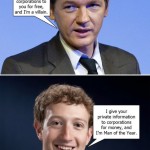If you’re going to be crazy, you have to get paid for it or else you’re going to be locked up.
Hunter S. Thompson
The Columbia Journalism Review has cranked up The News Frontier Database, “…a searchable, living, and ongoing documentation of digital news outlets across the country.” They launched with a list of about fifty digital news sites, the beginning of an ambitious effort to catalog sites that meet the following criteria:
- Digital news sites included in the NFDB should be primarily devoted to original reporting and content production.
- With rare exceptions, the outlet should have at least one full-time employee.
- The digital news site should be something other than the web arm of a legacy media entity. (There’s no doubt that some of the most important online journalism is being produced by the websites of newspapers and other legacy media, but this database is devoted to a new kind of publication.)
- The digital news site should be making a serious effort to sustain its work financially, whether that be through advertising, grants, or other revenue sources.
That third criterion helps the database administrators focus, but it does little to advance the cause of gathering information about online news. Surely “legacy” online publishers that shift from print to pixels deserve recognition. And those who augment their dead tree efforts with electronic publications are among the most informative, best positioned news outlets online. (Click here for the list of outlets in the CJR database.)
Five years ago “The Media Consortium” was organized. Participants in the consortium must have
- A journalism-driven mission
- Staff and organizational capacity to participate in projects that benefit the organization and the Consortium
- The commitment of senior leadership to personally participate in Media Consortium activities, projects, and meetings
- A mission that promotes progressive ideals
When I heard about the CJR database, I thought it would be interesting to see how many of the Media Consortium members were listed. The CJR list includes a lot of familiar sites, some of them liberal. For example CJR lists Slate, Salon, The Huffington Post, TPM, and Politico. But the only Media Consortium member they list is Grist. Several of the consortium members are disqualified by the CJR criterion number 3 (“…something other than the web arm of a legacy media entity”). Among these, I suppose, would be The American Prospect, Mother Jones, The Nation, and The Progressive. But, while the CJR database is in its early days exclusion of the entire consortium membership except for Grist betrays a blind spot when it comes to progressive media. There are dozens of high-profile local, regional, and global news sites that meet the CJR criteria that aren’t listed yet. Among the Media Consortium sites that could qualify as web journalism pioneers and important to include in any catalog “new media,” or digital journalism efforts are: Afro-Netizen, Alternet, Campus Progress, Chelsea Green, Democracy Now, Feministing, Reproductive Health Reality Check, Truthout, and Workers Independent News.
These two sources, Columbia Journalism’s News Frontier Database and the Media Consortium, have each listed 50 emerging media news sources. It’s amazing that the only site they have in common is Grist.







